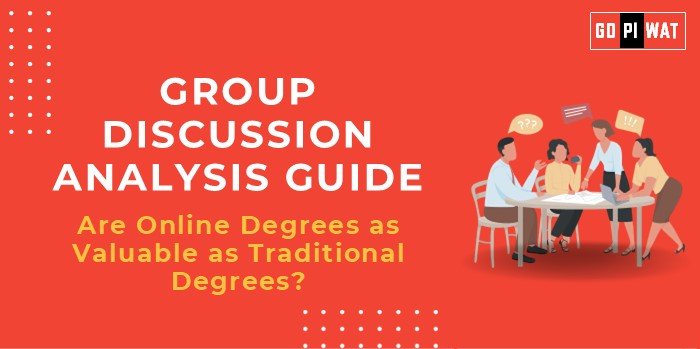📋 Group Discussion Analysis Guide: “Are Online Degrees as Valuable as Traditional Degrees?”
🌐 Introduction to the Topic
- 📜 Context: With the rise of e-learning platforms like Coursera, edX, and university-affiliated online programs, the debate around the value of online degrees versus traditional degrees has gained global relevance.
- 📖 Background: Traditional degrees have long been considered the benchmark for academic and professional success. However, advancements in technology and accessibility have positioned online degrees as viable alternatives. During the COVID-19 pandemic, online learning received a significant boost, reshaping perceptions.
📊 Quick Facts and Key Statistics
- 🌍 Online Learning Growth: The global e-learning market was valued at $315 billion in 2021 and is projected to grow to $645 billion by 2030 (Source: Statista).
- 💼 Adoption Rates: 47% of large organizations globally use e-learning to train employees, indicating its growing professional acceptance.
- 🎓 Student Outcomes: 83% of organizations believe online learning can achieve equivalent or better outcomes compared to in-person methods (Source: LinkedIn Learning).
- 💰 Flexibility and Access: Online programs offer a 75% cost reduction in travel and accommodation compared to traditional on-campus learning.
👥 Stakeholders and Their Roles
- 🏛️ Universities and Institutions: Designing credible and industry-relevant online degree programs.
- 🤝 Employers: Evaluating online degrees for hiring and promotions.
- 🎓 Students: Balancing costs, flexibility, and quality of education.
- 🌐 Regulatory Bodies: Ensuring accreditation and standardization of online programs globally.
🏆 Achievements and Challenges
✨ Achievements
- 🌟 Increased Accessibility: Millions worldwide have gained access to higher education due to online platforms.
- 💵 Affordability: Online degrees often cost 50–70% less than traditional ones, expanding education to underprivileged regions.
- 🌎 Global Outreach: Programs from top universities reach international audiences.
⚠️ Challenges
- 📉 Perception Gap: Many recruiters still prioritize traditional degrees over online ones.
- 📋 Quality Assurance: Concerns about the lack of hands-on learning and peer interaction.
- 🌐 Digital Divide: Unequal access to the internet in rural areas hampers equitable participation.
📚 Global Comparisons and Case Studies
• United States: Widely accepted online MBAs and master’s programs.
• India: Limited acceptance in traditional sectors, though growing in IT and tech industries.
• Case Study: The University of Illinois Online MBA is widely recognized for its high ROI for students.
📢 Structured Arguments for Discussion
- 💬 Supporting Stance: “Online degrees are cost-effective, flexible, and provide comparable quality of education when supported by credible institutions.”
- 🗣️ Opposing Stance: “Traditional degrees offer richer networking opportunities, better hands-on experiences, and stronger employer recognition.”
- ⚖️ Balanced Perspective: “The value of a degree depends on its purpose, field of study, and the institution’s reputation, with online and traditional degrees serving different needs.”
📈 Effective Discussion Approaches
- 💡 Opening Approaches:
- “E-learning is projected to grow to $645 billion by 2030, indicating its rising importance in higher education.”
- “Universities like Harvard and MIT have launched online degrees accepted by top employers.”
- 💡 Counter-Argument Handling:
- “Address concerns of low credibility by highlighting examples of industry-recognized programs.”
- “Emphasize improvements in digital pedagogies to address quality issues.”
📊 Strategic Analysis: SWOT
Strengths
- 📈 Cost-effectiveness and accessibility.
- 🌎 Flexible global reach.
Weaknesses
- 🖇️ Limited interaction and hands-on experiences.
- 🎓 Credibility issues with some employers.
Opportunities
- 🌐 Expanding global student base.
- 📊 Integration with lifelong learning and reskilling markets.
Threats
- ⚡ Digital divide restricting access.
- 🌀 Varying levels of acceptance across industries and cultures.
🎓 Connecting with B-School Applications
- 💡 Real-World Applications:
- Explore themes like the future of work, digital transformation in education, and cost-benefit analyses for strategic management.
- 💡 Sample Questions:
- “How can online degrees compete with traditional ones in gaining employer acceptance?”
- “What role can hybrid education models play in bridging the gap?”
- 💡 Insights for Students:
- Develop perspectives on ed-tech and e-learning industries.
- Study online learning’s integration into corporate training programs.


